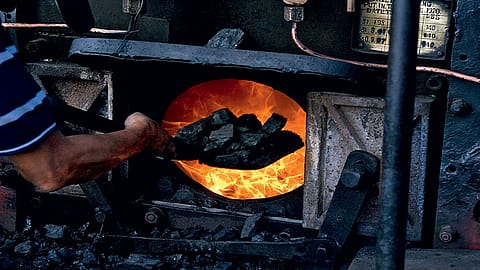The end of Coal India’s monopoly
The Cabinet Committee on Economic Affairs takes a decision to allow private sector to procure coal mines for non-captive requirements. But will it attract the likes of Rio Tinto<a></a>, BHP Biliton or even Vedanta?

After nearly four decades, Coal India’s monopoly over commercial sale of coal in the country has ended, at least on paper, as the government allows private companies to bid for coal mines without a restriction on the end-use of the fuel.
On Tuesday, the Cabinet Committee on Economic Affairs approved the methodology for auctioning of coal mines/blocks where buyers will be able to sell the coal in the open market without any price restriction.
A 2016 PwC report says that ninety per cent of the domestic production comes from public sector coal producers while only 10% is produced by the private sector. The private sector is only allowed to mine coal for captive use.
The auctions will be held under the Coal Mines (Special Provisions) Act, 2015 and the Mines and Minerals (Development and Regulation) Act, 1957, an official statement said. While the government claims that the opening up for commercial coal mining for the private sector is ‘the most ambitious’ coal sector reform since nationalisation of coal mining in 1973, the decision was expected since 2015.
The Coal Mines (Special Provisions) Act passed in 2015, following the Supreme Court’s decision to cancel mining leases to over 200 coal mines/blocks, the government had included a provision in the law to allow for private sector to enter commercial coal mining.
The discussions over the past three years have mostly been over the methodology and timeline.
After the first three round of auctions of coal mines, where end-use of the fuel was restricted to sectors like power, steel, aluminium, cement and others, attracted several bidders, the government had to cancel the fourth tranche of auction of coal mines/blocks with restricted end-use in 2016 due to a tepid response from the industry.
Recommended Stories
Data from the ministry of Coal suggests that till date, 13 out of the 31 mines auctioned with an end-use restriction have started operations. The operation of these mines generated Rs 2,543 crore of revenues that were passed on to the states of Chhattisgarh, Jharkhand, Madhya Pradesh, Maharashtra, Odisha and West Bengal, as on November 2017.
However, the Minister of Coal and Railways, Piyush Goyal is bullish on the demand for coal mines/blocks that would be up for auctioning.
“So far, mines have been auctioned with an end-use pre condition. Today, the Cabinet decided that commercial coal mining will also be allowed. The decision will bring in expert coal mining companies, with the most modern technologies into the country,” said Goyal at a media briefing after the Cabinet Committee on Economic Affairs met on Tuesday.
Goyal also said that it will end the monopoly of the government over commercial coal mining, and, “Ultimately, the decision would help reduce our coal imports and increase the country’s self-sufficiency. India has more than 300 billion tonnes of coal and we should not be importing coal.”
(INR CR)
India is the world’s second-largest coal importer, and third largest producer behind China and the U.S. A 2017 report by the government think tank Niti Aayog and The Institute of Energy Economics, Japan, says that coal will fulfill about 42-50 percent of India’s energy needs in the next 30 years. However, the report envisages that India needs to use its coal reserves efficiently and push for renewables keeping in mind the adverse effects of the dirty fuel on the environment.
Goyal mentioned that broadly the methodology for the auctions will be the same as before, except there will be no end-use or price restriction. “Companies will be able to bid through a transparent e-bidding platform. There will be a shortlisting process after the first round of bids and then the remaining will bid again in a transparent auction,” he said, adding that the auction will be anascending forward auction or an auction where the highest bidder wins.
All the revenue generated through royalty and the auction will be transferred to the state governments. Goyal said that the central government will merely play the role of a facilitator.
Coal India, which has produced 440.62 million tonne of coal so far this year, less than the target of 469.9 million tonne, saw its trading 1.53% lower on the Bombay Stock Exchange at Rs 305.50 on Wednesday morning.
Goyal said that the company will benefit from the decision in the long run. “Competition helps public sector companies improve. Look at what has happened in NTPC, NHPC, ONGC and others. Whenever competition comes in, the performance and efficiency of the public sector improves,” he added.
The question now is whether private sector bigwigs like Rio Tinto, BHP Biliton or even homegrown companies like Vedanta Ltd will enter the commercial coal mining space in India? The first reactions from the industry indicate a definite interest.
Anil Agarwal, chairman of Vedanta Ltd told Fortune India, “This is a path breaking and bold reform by the government. Opening the coal sector for private players will usher in much needed competition, increase domestic and FDI investment in the sector, drive in efficiencies as well has help in stabilising irregularities in coal supplies & linkages. The move will go a long way in making the entire coal sector vibrant and transparent.”
Vedanta Ltd, ranks 19th on the Fortune India 500 list for 2017. It’s shares were trading 1.57% lower on the BSE on Wednesday morning at Rs 323.10.
Anjani Agrawal, partner and national leader - metals and mining, EY said, “Opening the coal sector to commercial mining is a welcome step that would accelerate the adoption of technology, productivity and competitiveness in the coal sector. However, the success will depend on the size of blocks identified, flexibility of sales, distribution and pricing.”